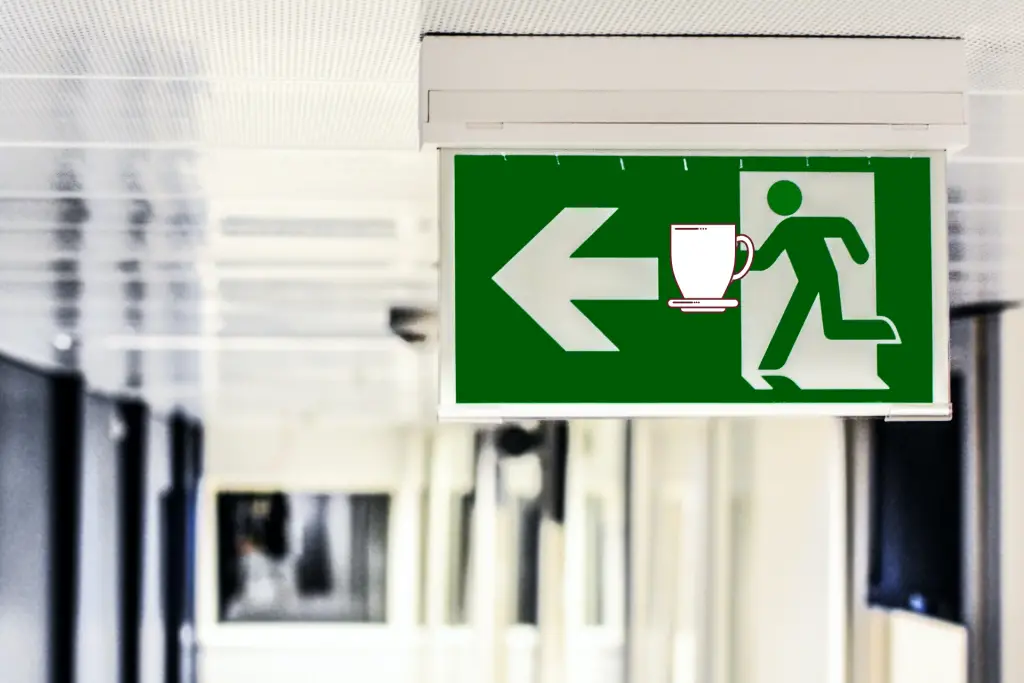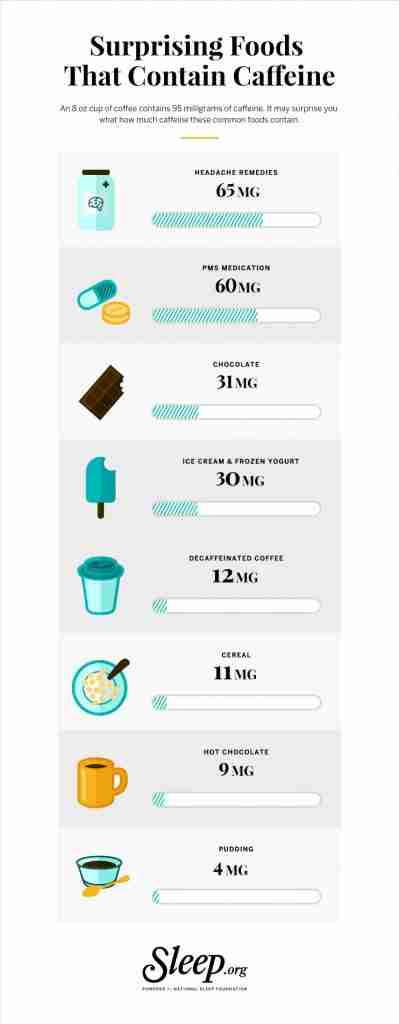
While you may feel the effects of drinking a coffee 30 to 60 minutes after taking your first sip, caffeine stays in your system much longer than you think. According to the American Academy of Sleep Medicine caffeine’s half-life in the body is up to 5 hours. This is the amount of time that it takes for the quantity of a chemical to be reduced in half.
For example, if you consume 20 milligrams of caffeine, after 5 hours you will still have half of that amount of caffeine in your body. 10 milligrams will still be present in your body.
If you have caffeine sensitivities you may feel the effects of caffeine for more than 5 hours and even days after initial consumption. It is recommended that you stay away from caffeine at least 6 hours before bedtime.
How Long Until Caffeine is Completely Out of Your System

As a person consumes more caffeine and coffee the body becomes more resistant to the drug. As a result, you may not feel its effects, but there will still be caffeine in your body. There is no set time limit to how long caffeine will stay in your body. This will vary from person to person depending on the age, body weight, and how sensitive they are to caffeine.
In the Bloodstream
The liver starts metabolizing caffeine once it enters your bloodstream. The caffeine is broken down into theophylline, theobromine, and paraxanthine. According to a study increased caffeine consumption is associated with reduced hepatic fibrosis (this is a good thing). These chemicals then travel around the body and affect you in many different ways.
In the Brain
Not all of the caffeine will be broken down in the liver and will travel throughout your bloodstream until it reaches your brain. This is a great TEDEd video that explains what happens to your brain when caffeine is present.
Leaving your Body

According to this study about the pharmacology of caffeine, the major pathway for caffeine after it is consumed is from the stomach to the bloodstream. 99% of the caffeine is absorbed within the first 45 minutes. Then the human body converts most of the caffeine (70 – 80%) in your body into paraxanthine with no toxic effects. Then this is urinated out, and this is the major pathway for caffeine metabolism.
Breastfeeding
People are told not to consume caffeine when breast-feeding because it can pose a risk to both the mother and child. Caffeine can be transferred from the breast milk from the mother to the child.
In a study done it showed that the caffeine consumption from the breast milk had little or no consequences on sleep for children aged over 3 months. However, larger amounts of caffeine may still cause trouble in children with developing sleep patterns. It is better to stay on the safe side and have a 1 – 2 hour period between caffeine consumption and breastfeeding.
Urination
In our article “Is Coffee a Diuretic” you can see how coffee affects your bladder and what a diuretic is. In short, it means you will have an increased frequency of urination.
Caffeine is thought to have an effect on a specific smooth muscle in the bladder that may cause bladder contraction. It irritates the tissues and muscles of the bladder and as a result causes increased urination.
What Foods Contain Caffeine?
There are a lot of foods that contain caffeine that you might not be aware of. This can be a double-edged sword so it is important to know what kinds of foods will contain caffeine and you can use it to your benefit. However, consume them at the wrong time such as before bed and you will be in trouble!
- Soft drinks
- Coffee drink such as espressos, lattes, and cappuccinos
- Energy drinks
- Tea
- Chocolate products
- Coffee
- Protein and energy bars
- Pre-workout drinks and foods
- Weight loss pills
- Headache medicines
- Decaffeinated Coffee
- Ice Cream
- Frozen Yogurt
- Breakfast Cereals
- Pudding
- PMS Medications
- Kombucha
- Match
- Oreos
- Soymilk
- Pie
- Milkshakes
- Some brands of candy
- Brownies
- Granola & granola bars
- Caramels
- Some brands of gum
- Some brands of mint

How to Remove Caffeine From your Body
If you are stuck with coffee jitters and want a way to get rid of them here are some solutions. Of course, some of these methods will not work if it’s late at night, but sometimes you can’t do anything to speed up the process. You might have to wait it out and eventually it will go away on its own… after a restless nights sleep.
1. Water
Water is the most effective way to rinse out the caffeine from your body. By drinking excess water you can flush out the caffeine and decrease the effects of caffeine by hydrating yourself. If you are dehydrated your body will be feeling the effects of caffeine more.
2. Exercise
Exercising will speed up your metabolism and help metabolize the caffeine in your body and help you rid yourself of any jitters you have. Any sort of exercise will work. A brisk walk, working out, stretches, yoga, and jogging all work.
Unfortunately, the caffeine is metabolized in your liver and you cannot speed up that process. You will get rid of the excess energy but the caffeine will still be in your body. It may be dangerous to exercise with too much caffeine in your bloodstream if you have heart conditions as it may cause heart palpitations or even heart attacks.
3. Combining Drugs
You may think that because coffee is a stimulant that all you would have to do is combine it with a depressant to counteract the effects. However, it is not that simple. You cannot mix uppers and downers and if you do you will be left with some serious side effects. Previously, in 2014 when Four Loko still contained caffeine it was linked to several deaths because of this issue. People felt alert because of the caffeine and got behind the wheel when they shouldn’t have and many people got hurt.
There is some evidence that smoking marijuana can speed up the liver’s metabolization speed. There isn’t enough data to scientifically prove this. More research will need to be conducted before this is used.
4. CYP1A2 Enzyme
According to a study done by the Oxford Journal of Carcinogenesis the only way to shorten the half life of caffeine in the body is to increase your production of the CYP1A2 enzyme.
This enzyme is created in the body when your diet is rich in cruciferous vegetables. These vegetables are broccoli, cauliflower, and brussel sprouts. Apiaceous vegetables, carrots, celery, and dill reduced CYP1A2. The process of absorbing the food takes at least eight hours so the best way to prepare and remove caffeine would be eating a healthy diet filled with a lot of broccoli, cauliflower, and brussel sprouts.
Caffeine and Vitamin C

Caffeine affects vitamin c concentration in your blood because it blocks the absorption of vitamin c into your bloodstream. Due to the need to urinate more often and the blocked absorption of vitamin c, you may not have a chance to absorb it before it is passed out of the body.
Bottom Line
While coffee is great at keeping us awake and alert it is hard to get it out of our body. If you are planning on sleeping or napping within 5 hours it may be better to skip that cup of coffee.

